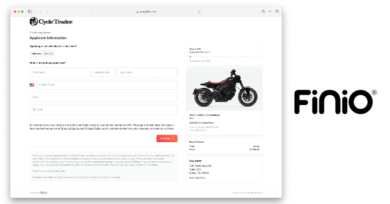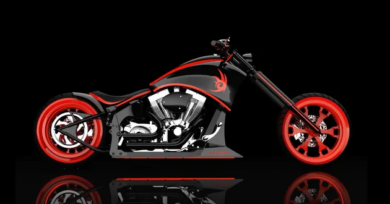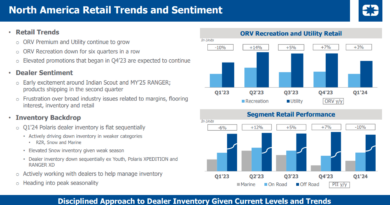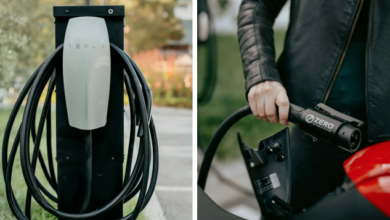Dealer Expo 2006
Getting fussy over customer care
Some powersports dealers might fuss over the way merchandise is displayed. Most probably fuss over their financial records.
But do enough dealers fuss over their customers?
The answer should be a resounding yes, according to F.U.$.$. Follow-Up Sales Systems, which has made it its business to fuss over customers for 26 years. The Arkansas City, Kan.-based company, which will be at this year’s Dealer Expo, currently serves more than 1,000 powersports dealers across the United States.
“Customers are absolutely the lifeblood of any business,” said Kasha Kelley, F.U.$.$.’s chief executive officer. “If you don’t treat them well, they’re going to go somewhere else.”
That’s the idea behind customer care: to keep customers coming back by building loyalty between a customer and a particular dealership. When customers return to a dealership, it ultimately leads to greater success for that dealership.
Personal attention with a little personal touch at just the right time is what it takes, Kelley said.
In the beginning
Not so long ago, dealers were only concerned with making money, Kelley said. It wouldn’t matter who they sold something to, as long as they could add to the bottom line. F.U.$.$. aims to change that way of thinking.
When Greg Kelley, Kasha’s father, started the business in 1979, “customer care wasn’t something people understood,” Kasha Kelley said. “People thought about selling something and getting the money from it. We were the first in the (powersports) industry to do (customer care).”
In the late ‘70s, some follow-up systems had been developed for the automobile industry, but no one had specifically targeted motorized recreation industries. After research and development, Greg Kelley, along with his wife, Diana, decided to create a follow-up business just for the powersports industry, which was just beginning to gain national popularity.
Up to 1985, all the materials F.U.$.$. created were made specifically for motorcycles, all terrain vehicles and the like. The company has since expanded into other industries, but powersports dealers remain the focus, making up 80 percent of F.U.$.$.’s clientele.
Communication is the key
Customer care is all about keeping in contact with customers and doing so at strategic times, Kelley said. With F.U.$.$., dealers can choose between a one-year program, in which customers would be sent periodic communications throughout the year after their purchase, up to a five-year program, in which some of the same communications are repeated over the years, along with varying additional pieces. Separate programs are available for new and used motorcycles, ATVs, personal watercraft and snowmobiles.
All typical F.U.$.$. programs start off with an immediate thank you card. Dealers can opt to include a coupon, if they like, although F.U.$.$. uses the word coupon loosely, Kelley said. It can be used to make an announcement, list store hours, make an offer of some kind or act in any other way a dealer might want.
“The idea is the better the offer, the better chance the customer will return,” Kelley said.
An owner’s letter follows the thank you, and acts as an introduction to F.U.$.$. surveys. The size of a postcard, the survey has questions such as “What brought you in?” and “Would you recommend this dealership to others?” The customer answers the questions by checking boxes and then places it in the mail.
Dealers have found the surveys beneficial, as they can learn about customer-satisfaction issues, as well as gather demographic information about their customers.
“I was (trying to motivate) two new mechanics and pulled out a stack of follow up cards,” said Tom Leighton, dealer principal of Two Wheels in Hawaii. “I love reading them. Sure once in awhile we get a bad comment, but most are good. They give us a good handle on how we’re doing our job.”
Next to arrive in a customer’s mail box would be a service department letter, including a coupon for a discount on the next time the powersport vehicle is serviced or some other offer that fits the dealership.
“We want to build that (service) loyalty and loyalty to the entire dealership,” Kelley said. “It will become a one-stop shop so they’ll step back inside the store.”
A parts and accessories letter comes next and also includes a coupon. F.U.$.$. creates Thanksgiving cards and birthday cards for both the primary and secondary buyer as well. Dealers can opt to include a certificate with the primary buyer’s birthday card for something they can pick up on their birthday. An anniversary of purchase letter rounds out the first year of communications.
Keep in touch
The intent of all this correspondence is keeping the dealership fresh in customers’ minds.
A repeat customer can have a substantial impact upon a dealership over the course of his or her lifetime, not only through their own patronage, but by spreading the word about the dealership to friends, family, neighbors and others.
“Allow them to become a walking advertisement for you,” Kelley said.
There isn’t a specific formula for figuring out what strategic times of communication are best, Kelley said. It has taken F.U.$.$. years with people in the powersports industry and an understanding of business, timing and follow up to formulate its method, which changes with research and development.
So far, Leighton is more than satisfied with the service.
“Staying in touch with your customers is good common business sense,” Leighton said. “The cost is very minimal.”
A typical one-year program costs less than $10 per customer and includes all of the aforementioned communications. Each additional year costs more, but dealers can get a five-year plan for less than $20 per customer.
Leighton was an early user of F.U.$.$. He saw the company at an event in the early 1980s, when he and F.U.$.$. were just getting started. He liked what they had to offer and signed on. Over the years, using F.U.$.$. has been beneficial enough for Two Wheels that the dealership is looking into expanding its use of the service.
F.U.$.$. brings interaction with a customer full circle, Leighton said.
“We build the relationships, F.U.$.$. cements them in,” he said.
To be effective, F.U.$.$. needs to be up to date on everything. That’s why earlier this year, F.U.$.$. switched to a software system written for the company and its unique needs. Called C.R.O.S., or Customer Relations of Steroids, the software was named by Greg Kelley.
Although technology enables the company to run efficiently, human interaction is key for F.U.$.$. The company’s Web site even has an area where current and prospective clients can request that a representative call them within minutes.
“Calling up and getting an automated voice recording can be very frustrating,” Kasha Kelley said. “We always want people to reach somebody during business hours. That personal touch is always in style. (Follow-up software programs) are limited in their scope and have to be managed. We call ourselves a glorified secretary. We’re here all the time making sure our clients’ customers get followed up.”
Running F.U.$.$. is a challenge. The company is constantly looking for ways to stay fresh and relevant, Kelley said. Innovations such as the Very Important Customer Gold Card and F.U.$.$. publicity have moved the company along thus far, but they’re always looking for something new.
The work is not without rewards, though, Kelley said.
“One of the most rewarding things about our business is that we get to see people become more successful,” Kelley said. “It’s very rewarding to see people grow and make their bottom line better.”
Keys to the repeat customer
Customer care can be time consuming, especially if a dealership tries to manage on its own. It is, nevertheless, an important part of any dealership. In a small community, where the powersport-buying customer base is smaller to begin with, customer care becomes even more essential.
“I’m on an island that only has 5,500 people,” said Tom Leighton, dealer principal of Two Wheels. “We depend entirely upon repeat business.”
Leighton does business in Kapaa, on the island of Kauai in Hawaii. In such a small community, repeat business is imperative. Keeping in contact with customers builds the foundation for a longer term relationship, even friendship, between customers and the dealership. It also gets the conversation going between customers and those around them, hopefully building interest in the dealership.
For any kind of communication a dealership might send to a customer after the sale to be effective and get the customer back to the store, the customer has to have had a positive experience at the dealership in the first place.
At Two Wheels, children and grandchildren of former customers have started coming in to buy powersports vehicles. That wouldn’t happen without a positive first experience, Leighton said.
In small communities, the fight for market share can get highly competitive. In such a case, follow up can mean the difference a future repeat customer and one that goes away less than impressed.
A personal touch can make all the difference in the world, said Kasha Kelley, chief executive officer of F.U.$.$. Follow-Up Sales Systems. The little things do have an impact and add to those relationships.
“We do everything we can so they don’t go to other islands or the mainland to shop,” Leighton said. “If you don’t treat the local people kindly, they’ll shop other places.”




